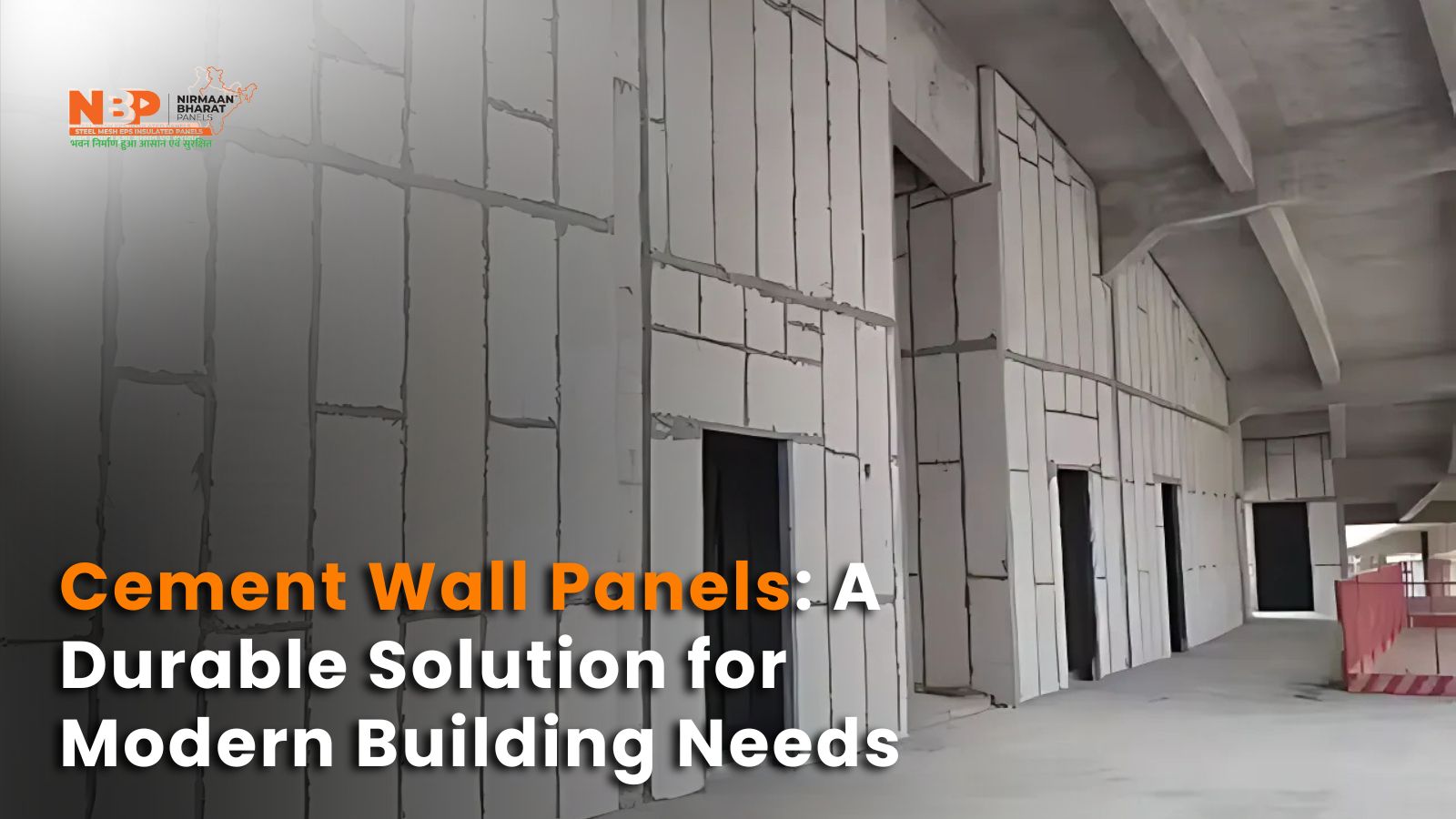In the realm of construction, the quest for innovative, sustainable, and durable materials is ever-present. Among the numerous options available, modern Cement Wall Panels in India have emerged as a popular choice for architects, builders, and homeowners alike. Known for their strength, versatility, and efficiency, these panels offer a reliable solution for modern building needs. This blog will delve into the features, benefits, applications, and maintenance of these panels, positioning them as a compelling alternative to traditional building methods.
Table of Contents
ToggleUnderstanding Cement Wall Panels
Cement Wall Panels are precast elements used to construct walls in residential, commercial, and industrial buildings. These panels are typically made from a mixture of cement, aggregates, and additives, which enhance their strength and durability. They come in various sizes and thicknesses, catering to different construction requirements.
Types of Cement Wall Panels
- Precast Concrete Panels: These panels are cast in a controlled environment and then transported to the construction site for installation. They provide excellent structural integrity and can be customized in various shapes and finishes.
- Insulated Panels: Combining insulation with concrete, these panels offer enhanced thermal performance, making them ideal for energy-efficient buildings. They assist in maintaining indoor temperature levels, thereby lowering expenses associated with heating and cooling.
- Thin Wall Panels: Designed for applications where space is limited, thin wall panels are lightweight yet strong, making them suitable for interior walls and partitions.
- Architectural Panels: These panels are specifically designed to enhance the aesthetic appeal of a building. They can be finished with various textures, colors, and patterns to complement architectural designs.
Advantages of Cement Wall Panels
1. Durability and Strength
These concrete panels are renowned for their durability. Made from high-quality materials, they are resistant to weathering, rot, and pests, ensuring longevity. Unlike traditional materials like wood, concrete does not warp or shrink, making it a stable choice for any building structure.
2. Cost-Effectiveness
While the initial investment for Cement Wall Panels may be higher than traditional materials, their long-term cost-effectiveness is significant. Their durability reduces maintenance costs, and their energy-efficient properties lead to lower utility bills. Furthermore, the speed of installation can also reduce labor costs, making these panels a financially savvy choice.
3. Energy Efficiency
Insulated versions of these panels provide superior thermal performance, helping to maintain a comfortable indoor environment while minimizing energy consumption. This energy efficiency can lead to substantial savings on heating and cooling costs, making them an attractive option for eco-conscious builders and homeowners.
4. Quick Installation
One of the primary advantages of these panels is their ease of installation. Precast units can be erected quickly, allowing for faster project completion. This speed of construction can be particularly beneficial in commercial projects where time is of the essence.
5. Fire Resistance
Concrete is inherently fire-resistant, providing an added layer of safety to buildings constructed with these panels. This characteristic can be crucial in areas prone to wildfires or in commercial buildings where fire safety regulations are stringent.
6. Sound Insulation
Cement Wall Panels offer excellent sound insulation properties, making them ideal for residential buildings, hotels, and commercial spaces where noise reduction is essential. They can significantly enhance the acoustic comfort of a space, ensuring a peaceful environment.
7. Design Flexibility
These panels can be customized to suit various architectural styles and preferences. With a range of finishes, colors, and textures available, they can seamlessly blend with any design aesthetic, from contemporary to traditional.
Applications of Cement Wall Panels In India
These versatile panels can be used in a variety of applications, including:
1. Residential Construction
Cement Wall Panels are increasingly used in residential buildings, offering homeowners durable, energy-efficient, and low-maintenance solutions. Their aesthetic flexibility allows for creative designs that enhance curb appeal.
2. Commercial Buildings
Many commercial spaces, including offices, retail outlets, and warehouses, benefit from the strength and cost-effectiveness of these concrete panels. Their quick installation times can minimize disruptions to business operations during construction.
3. Industrial Facilities
In industrial settings, these panels provide the durability needed to withstand harsh environments. They are often used in manufacturing plants, storage facilities, and distribution centers.
4. Educational Institutions
Schools and universities can utilize these Cement Wall Panels for their buildings to ensure safety, durability, and energy efficiency. Their sound insulation properties are particularly beneficial in creating conducive learning environments.
Maintenance of Cement Wall Panels
Maintaining these panels is relatively straightforward. Here are some essential maintenance tips:
- Regular Inspections: Conduct routine inspections to check for any cracks or signs of wear. Tackling minor concerns promptly can avert the emergence of more serious issues later on.
- Cleaning: Dirt and debris can accumulate on the surface of the panels. Regular cleaning with water and mild detergent can help maintain their appearance and prevent staining.
- Repairing Cracks: If any cracks or damage are detected, they should be repaired promptly using appropriate cement-based repair compounds to maintain the panel’s integrity.
- Checking Joints: Inspect the joints between panels for any signs of wear or gaps. Ensuring proper sealing can help maintain insulation and prevent moisture infiltration.
- Painting: If desired, these panels can be painted to enhance their appearance. Use high-quality, weather-resistant paint for best results.
Conclusion
Cement Wall Panels represent a durable, efficient, and versatile solution for modern building needs. With their numerous advantages, including strength, energy efficiency, and design flexibility, they are becoming a preferred choice for architects and builders across various sectors. As the construction industry continues to evolve, embracing innovative materials like these panels will pave the way for more sustainable, cost-effective, and aesthetically pleasing buildings.
Incorporating these panels into your construction projects not only enhances structural integrity but also contributes to a more sustainable future. Whether you are constructing a new home, office, or industrial facility, consider the benefits of these panels as a reliable and innovative alternative to traditional building materials. Embrace the future of construction with modern Cement Wall Panels in india and experience the difference they can make in your building projects.
FAQs
Q1. How do Cement Wall Panels compare to traditional brick walls?
Ans: Cement Wall Panels offer several advantages over traditional brick walls, including faster installation, greater durability, and superior insulation properties. While traditional bricks may require more maintenance and are heavier, these panels can be customized for various applications and are often more cost-effective in the long run.
Q2. Are Cement Wall Panels environmentally friendly?
Ans: Yes, they can be environmentally friendly, especially when they include insulation for energy efficiency. Their durability reduces the need for frequent replacements, and many manufacturers are adopting sustainable practices in production. Additionally, these panels can be designed to minimize energy consumption in buildings.
Q3. Can Cement Wall Panels be used in all climates?
Ans: Yes, they can be used in various climates. Their insulating properties help maintain indoor temperatures in both hot and cold environments, making them a versatile option across different geographic regions.



